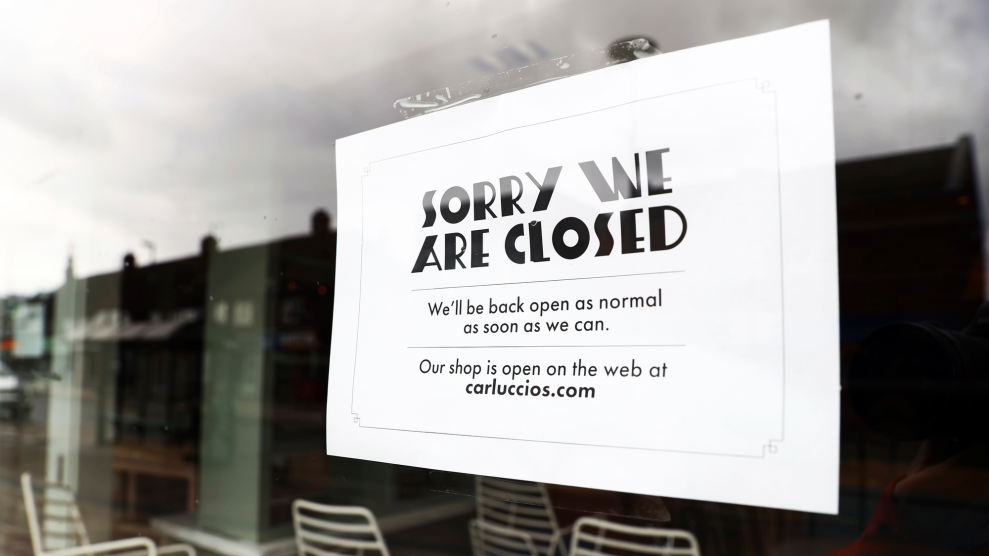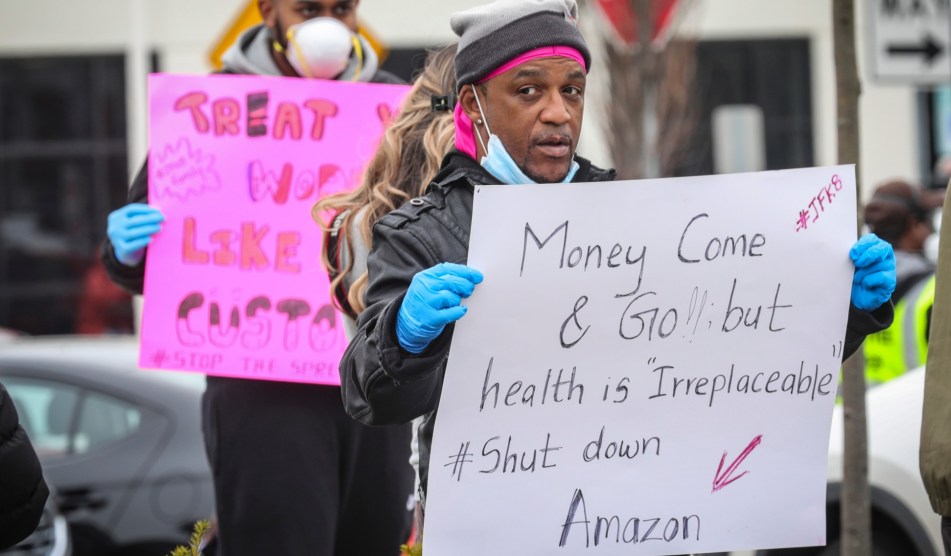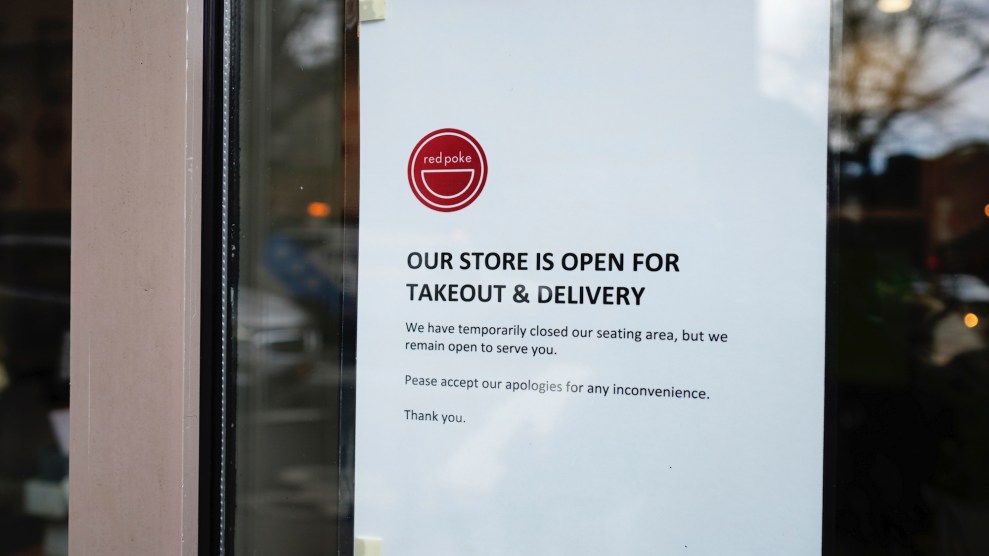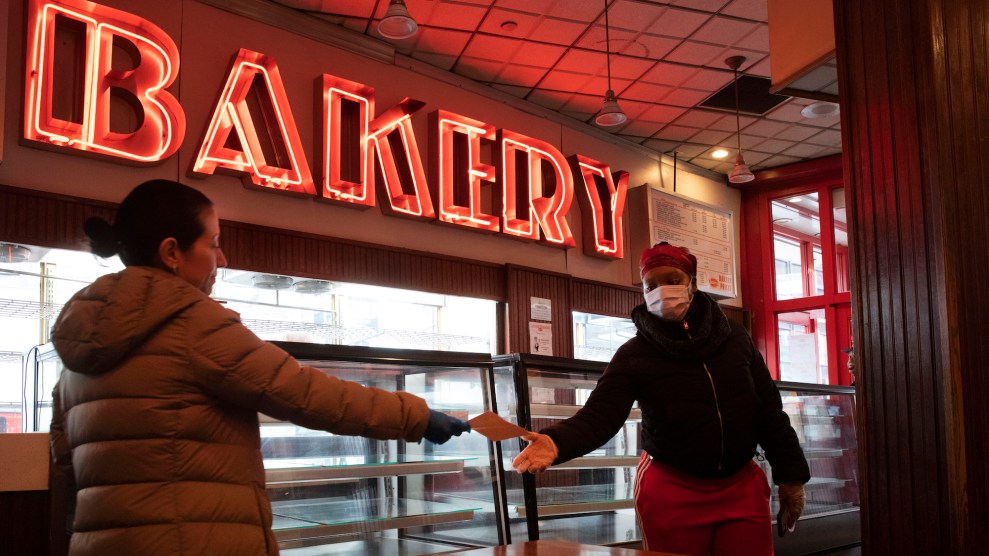
Tim Goode/AP
Cristan learned last month that the bustling Oakland restaurant where he made craft cocktails for 12 years was ceasing “non-essential” functions and shifting to takeout and delivery to help contain the coronavirus. The San Francisco Bay Area’s entertainment and cultural engines were grinding to a halt, prompting mass layoffs.
“It was Friday the thirteenth,” says Cristan, who is undocumented and asked to use his first name to protect his identity. Cristan lives with his partner and two little boys about 15 minutes south of Oakland. His partner, who worked part-time, also lost her restaurant job.
Like immigrants throughout history, Cristan left the little town in Zacatecas, Mexico, where he was born because there were no jobs there. His mom, dad, sister and two brothers still live there. He sends them money whenever he can. He liked bartending because it gave him both flexibility and stability. “But more than that it allowed me to support my family,” he says in Spanish.
Before efforts to control the coronavirus forced bars and dining rooms across the country to close their doors, the restaurant industry was booming. Food preparation and serving jobs were among the fastest growing in the nation, according to the Bureau of Labor Statistics. But they were also the lowest-paying jobs.
In Winston-Salem, North Carolina, chefs banded together to feed their unemployed workforce. Hear about it on the latest episode of Bite:
Now, millions of laid off restaurant workers, many who made just $2.13 an hour plus tips—the federal minimum wage for tipped workers—are scrambling to pay their bills and feed their families.
The COVID-19 crisis throws into stark relief the restaurant industry’s unjust labor practices, says Saru Jayaraman, co-founder and president of the nonprofit Restaurant Opportunities Centers United and director of the Food Labor Research Center at the University of California, Berkeley.
Jayaraman estimates that 4 million workers have already lost their jobs and she expects millions more to be laid off in the coming weeks. Her advocacy group One Fair Wage launched an emergency fund last month to help tipped workers survive the nationwide shutdowns. More than 50,000 people signed up in five days. “About three workers are signing up a minute,” she says. “We’ve been overwhelmed with the desperation.”
Jayaraman blames the desperation on the “severe greed” of the National Restaurant Association, the industry’s trade and lobbying group, which she says has argued for years that there’s no reason to increase wages because workers get tips. But these mass layoffs have left many tipped workers with nothing the next day, she says. “Now you see precisely the problem of employers not paying their workers all this time.”
Many restaurant workers are paid what’s called a “subminimum” wage on the assumption that tips make up the difference and that employees end up getting paid the same as others who work minimum-wage jobs. Employers have long relied on tips to keep wages low and restaurants afloat. But most servers have plenty of stories about big parties monopolizing a table for hours and leaving just 5 percent or less of the bill as a tip.
And unless a server works in a high-end restaurant (most do not) where tips usually go on a credit card, they get cash tips, which are hard to keep track of and often aren’t reflected on pay stubs. That means the tips don’t get factored into unemployment benefits when a worker is laid off.
In March, the restaurant association opposed legislation that would have increased the federal minimum wage from $7.25 to $15 an hour and eliminated the “tip credit” that is used to justify the lower minimum allowed for tipped workers. The association called the increase “harmful to both businesses and employees,” citing restaurants’ “razor thin” profit margins in a press release.
The association did not respond to requests for comment.
Most restaurant workers don’t offer sick pay, health insurance or other benefits. And undocumented workers like Cristan aren’t eligible for unemployment benefits. But even those who qualify for unemployment relief will have trouble covering their expenses if their tips don’t make it on to their pay stubs.
One in six restaurant workers live below the poverty line, according to the Economic Policy Institute, a nonpartisan think tank that studies low- and middle-income workers. Twice as many don’t earn enough for their family to cover basic things like rent, food and healthcare.
“Only seven states have what we call one fair wage, which is a full minimum wage with tips on top,” says Jayaraman. “So those workers are getting unemployment insurance based on $15 plus tips, whereas workers in most of the country are getting it, if they’re eligible, based on $2 or $3 an hour.”
Tipped workers might see a fraction of an income that was barely enough to cover expenses. It’s not just a make or break point, Jayaraman says. “It’s a disaster.”
The so-called subminimum wage for tipped workers hasn’t budged since 1991. California, where Cristan works, is one of the states that require full minimum wage plus tips. Melissa Hickman, meanwhile, works in Pennsylvania, one of 29 states that require employers to pay above the minimum wage, without specifying how much.
For the past four years, Hickman worked at the Olive Garden outside Pittsburgh making $2.83 an hour plus tips. And though customers often shortchanged her, especially during lunch, she made enough to pay her bills and even save a little.
Hickman, a 28-year-old single mother of three, learned she was laid off from Facebook. She was relaxing after her Sunday shift when she saw a post that Pennsylvania Gov. Tom Wolf had closed all restaurants and bars. “That’s how I found out,” she says.
The next day her manager posted a note on an Olive Garden servers Facebook group that the restaurant had to switch to takeout only. He said anyone who wanted to help with to-go orders should let him know. But there weren’t enough hours for everyone, so Hickman was out of a job.
Hickman received her first unemployment check about two weeks after she was let go, along with emergency pay from Darden, which operates the Olive Garden along with several other restaurant chains.
That’s a “huge turnaround” in the way Darden treats its workers after years of rebuffing demands for better pay and sick leave, says Hickman’s co-worker James Conway, who also lost his job. “While we question the timing of this, we applaud their efforts and hope it leads other corporations to follow suit.”
Jayaraman thinks the coronavirus crisis has forced many in the industry to see that the system is broken. “A lot of restaurant owners have changed their minds in the last week or two, because they’re seeing their employees go from having something to having absolutely nothing,” she says.
Some 70 percent of servers are women, mostly working at places like IHOP and Denny’s and mom and pop restaurants across the country. And now, suddenly they’re out of work, says Jayaraman. “I call it living tip to mouth because on Friday they had their last set of tips and maybe they use that to feed their kids on Saturday and Sunday. And by Monday, they have nothing, even those who have worked for decades.”
Nationwide, an estimated 10 percent of restaurant workers are undocumented, a figure that reaches 40 percent or more in urban centers. They include servers, bartenders, managers and even owners. It’s a stereotype that undocumented workers just fill back-of-the house jobs, says Jayaraman. “Our industry is full of immigrants, from top to bottom.”
Maria Moreno, an organizer at the Bay Area chapter of the Restaurant Opportunities Center in Oakland, is raising funds specifically for undocumented people because they’re at highest risk of having no money for food or rent. “People who have dependents and those who are undocumented will be first in line,” she says.
And since many of these workers don’t speak English they’re “just left completely in the dark.” So she’s trying to spread the word that “help is coming” in as many languages as possible. “Somebody asked us if there was translation to apply to our fund in Nepalese,” she says. “Finding translations for everyone day to day on this issue is a challenge.”
Oakland requires employers to provide sick leave to any employee who works at least two hours a week, capped at 72 hours. Cristan’s boss texted him to say he’d send a check for all his accrued sick pay. Since Cristan never took any sick time, he’ll get all 72 hours. And though his boss told everyone they should apply for unemployment, Cristan says he can’t. “It’s very risky for us,” he says.
The Trump administration announced a new rule in August 2019 that denies anyone who might need government assistance from entering the country on the grounds that they’d become dependent on taxpayer funds—a so-called public charge. After several federal lawsuits challenged the rule for conflicting with established interpretations of immigrant law, President Trump appealed to the US Supreme Court, which voted 5-4 in his favor. The rule went into effect in February, making it much harder for immigrants who might need government benefits like food stamps or Medicaid (in states where they’re available) to get a green card or stay in the US legally.
Then the next month, as the coronavirus spread, the US Citizen and Immigration Services encouraged all immigrants with potential symptoms to seek medical treatment without worrying about the rule.
But the reversal does little to assure many immigrants. There’s a lot of fear in the immigrant community, says Maria Figueroa, director of Cornell’s Labor and Policy Research at the Worker Institute, because Immigration and Customs Enforcement continues to detain people. Many undocumented workers won’t apply for benefits or go to the emergency room or anywhere else because they’re afraid of becoming a public charge. Detaining people is just exacerbating the public health crisis, Figueroa says.
Cristan for one doesn’t trust the administration’s assurances: “There are many things that people say, ‘nothing will happen to you.’ But then they decide to take you, and it doesn’t matter what they said.”
He doesn’t have health insurance because he can’t afford it with “crazy expensive” rent in the Bay Area, where the cost of living is more than twice as high as it is in McKeesport, where Hickman lives. And he’s never needed to apply for public benefits. But he wouldn’t even if he needed to because he doesn’t want his name in a database that could jeopardize his ability to stay in the States.
The federal government’s $2-trillion stimulus package, passed last month, significantly expands unemployment benefits and makes testing for the virus free—for everyone except undocumented immigrants.
Oakland Undocumented Relief Fund, Roc Relief, One Fair Wage Emergency Fund and and other organzations across the country are providing financial assistance in an effort to fill the void left by the stimulus legislation.
Cristan hopes to get enough relief from these funds to scrape by. Until then, he’s been selling car parts and other items online to pay his bills and feed his family. He’s also using his credit card more. He also hopes Americans understand that immigrants are not coming here to take anything from anyone or take advantage of any benefits. “We’re here because the opportunity to make a living does not exist back home,” he says.
His boss has been texting him every week to check in. “He’s going to call me when they let us open again,” Cristan says. “I think I still got a job there.” When the call might come, though, is anyone’s guess.
















